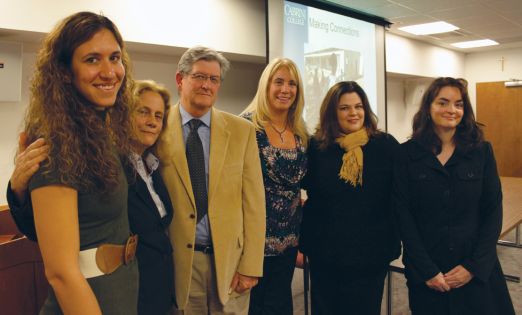The HIV and AIDS epidemic in Africa is quickly slaughtering its people as the world just watches. Dr. Shelby Hockenberry, assistant professor of political science, opened faculty and student’s eyes about the rampant disease and the effect it has on children, during this year’s Cabrini Day events on Nov. 15.
The country of Swaziland was the main focus of the discussion on how Cabrini can help with the spread of diseases.
“They are reaching pandemic levels in such countries as Swaziland that reached as high as 34 percent of the population,” Hockenberry said. “That’s pretty astounding when you think about it.”
Globally, there are 33 million people living with HIV and AIDS as of 2009, and 50 percent of people who are living with HIV/AIDS are women.
“About 75 percent of young people, 12 to 24 who are living with HIV/AIDS in Africa are female,” Hockenberry said. “So when you compare the global numbers to sub-Saharan Africa, it’s overwhelming.”
During the presentation, Hockenberry illustrated the statistics regarding the social and economic factors that contribute to AIDS in Africa. She also mentioned how studies have shown that women are being infected with HIV despite loyalty to one partner. In societies where women do not frequently have economic independence, HIV prevalence is higher.
“While many countries have begun to recognize gender issues, substantial numbers continue to fall short in areas of budget and policy support of such issues,” Hockenberry said.
Hockenberry also discussed several economic models to analyze the AIDS epidemic including ‘Top Down, Bottoms Up’ and several others. By doing this, she introduced various organizations that fund numerous AIDS awareness programs.
The Global Fund, which plays a key role in the economic assistance to Africa, has a board of directors who place votes to make important decisions about where the funding should be allocated.
“One person on the board equals one vote, which is really key,” Hockenberry said. “We can’t have the donors being more important than the people getting the aid.”
In 2009, the Global Fund provided 21 percent of all international HIV funding. As of 2010, the Global Fund has received total pledges of nearly 15 billion US dollars. The largest contributors are the U.S., Japan, France and the European Union.
After Hockenberry’s presentation, Dr. Beverly Bryde, associate professor of education, Joseph Clark, associate professor of education, Dr. Erin McLaughlin, assistant professor of business administration and Susan Pierson, assistant professor of education, shared their experiences about their trips to Swaziland.
The faculty presenters exhibited pictures of their journey through Swaziland.
“These children, these beautiful children, they are the promise and hope for the future of Swaziland,” Clark said. “This is a very troubled country and education of these children is a vital part of Cabrini Ministries today.”
Swaziland has limited resources in terms of education, food, water and shelter. With education, the least-prepared teachers are the ones educating in the rural schools. There is a cross-cultural gap in linguistics present in these schools, which makes it difficult for students to communicate with teachers.
Clark presented pictures of classrooms in which the desks were broken down, trash that littered the floors and the lack of cleanliness was apparent.
Christina Starken, Cabrini alum, mentioned in her presentation that there are certain strategies in which the Campus Ministers help out over in Swaziland with the lack of education.
“The teachers help the students by reading verses from the bible because the children have so much faith,” Starken said. “I’ve never met so many people in my life who have so much faith that things will get better.”



